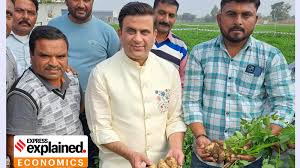Contract Farming in India

- 31 Jan 2025
In News:
Contract farming has emerged as a significant model in India's agricultural landscape, especially with its success in processed potato cultivation and the recent rise in French fry exports. As the country transitions from being an importer to a major exporter in sectors like frozen French fries, the contract farming model underpins the structural transformation of Indian agriculture.
Understanding Contract Farming
Contract farming is an agricultural production system where farmers and buyers (agribusinesses, processors, exporters, or retailers) enter into a pre-harvest agreement. This contract outlines key parameters including price, quality, quantity, delivery schedules, and in many cases, input provision and technical assistance.
Types of Contract Farming Arrangements
- Direct Input Provision by the Company: Firms supply seeds, fertilizers, and support services, deducting costs from the final payment to farmers.
- Partnership with Local Input Dealers: A hybrid model balancing company control with third-party services, chosen based on crop complexity, local support availability, and firm capabilities.
Advantages of Contract Farming
- Stable and Enhanced Income: Contracts assure farmers of a fixed price and market access, shielding them from volatile markets. RBI data shows farmers typically receive only 31%–43% of consumer prices; contract farming can significantly improve this share.
- Access to Inputs and Technology: Companies provide high-quality seeds, fertilizers, training, and modern farming practices, leading to improved yields and quality.
- Post-Harvest Efficiency: Streamlined procurement reduces wastage of perishables and post-harvest losses, ensuring efficient supply chain management.
- Credit and Financial Support: Assured incomes help farmers access institutional credit, reducing dependency on informal lenders.
- Food Safety and Export Standards: Training on pesticide use and residue limits ensures compliance with international standards like Maximum Residue Limits (MRLs), boosting export potential.
- Consumer Benefits: Direct procurement reduces intermediaries, enabling competitive pricing and higher quality products.
- Technology Transfer: Farmers benefit from the introduction of new, high-efficiency production techniques.
Concerns and Challenges
- Power Imbalance: Small and marginal farmers often lack bargaining power. This dependency may lead to exploitative contracts or one-sided terms, especially where firms demand investments in crop-specific infrastructure.
- Market Risk and Default: Price volatility can lead to side-selling by farmers or contract breaches by firms when market prices crash.
- Delayed Payments and Inputs: Contractual delays in payment or input delivery can severely affect crop cycles and farmer finances.
- Exclusion of Marginal Farmers: For economies of scale, firms often prefer large landholders, sidelining smallholders.
- Environmental Impact: Monocropping, overuse of water and agrochemicals, and soil degradation threaten long-term sustainability.
- Food Security Trade-offs: A shift to high-value crops under contracts may reduce acreage for food crops, impacting local food security.
- Loss of Autonomy: Farmers may lose control over farming decisions, with firms determining most aspects of cultivation, leading to indirect control over land use.
Case Study: Contract Farming in Potato Sector
India is the second-largest potato producer globally, with Uttar Pradesh, West Bengal, and Bihar as leading states. The Central Potato Research Institute (CPRI), Shimla developed several high-yielding Kufri varieties to support commercial cultivation.
The success of processed potato farming is best illustrated by India’s emergence as an exporter of frozen French fries, driven by contract-based procurement from farmers. However, issues such as the PepsiCo vs. Indian farmers legal dispute over unauthorized cultivation of the FL 2027 variety underline ongoing concerns around intellectual property rights and farmers’ autonomy.
Policy and Legal Framework
- Model APMC Act, 2003: Introduced contract registration, dispute resolution, and exempted market fees while protecting land ownership.
- Model Agricultural Produce and Livestock Contract Farming Act, 2018: Proposed institutional frameworks, insurance provisions, and promotion of Farmer Producer Organizations (FPOs).
- e-NAM Integration: Supports transparent pricing and contract enforcement.
- National Agriculture Policy: Endorses contract farming as a tool for enhancing productivity and rural incomes.
